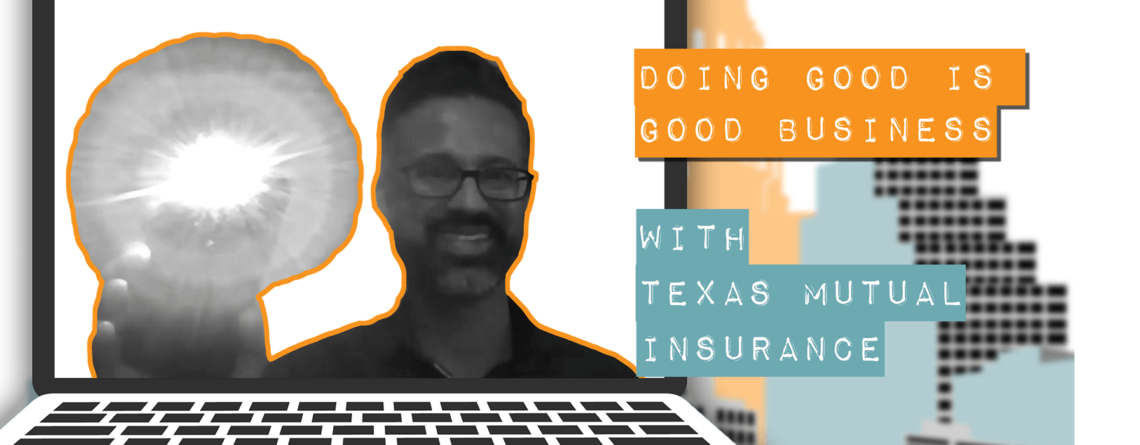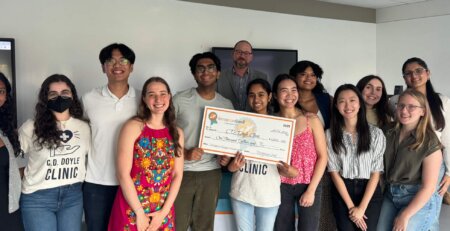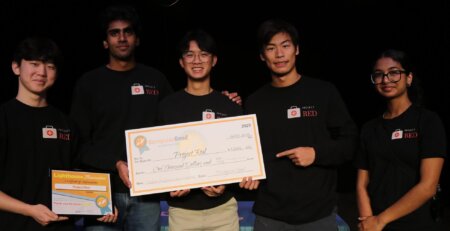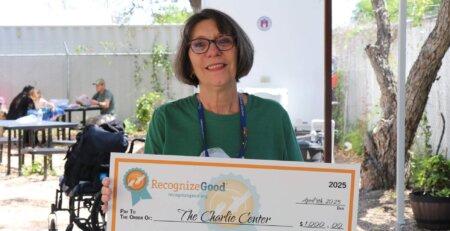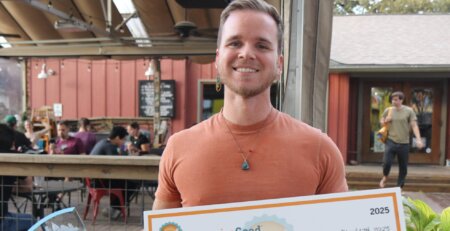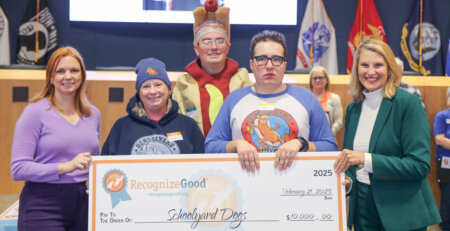Doing Good is Good Business: Jeremiah Bentley, Texas Mutual Insurance
Amit2024-01-22T16:50:42-06:00RecognizeGood took its 2020 Ethics in Business Awards program virtual, and got to interview this year’s award finalists in-depth via Zoom over the month of April. While our video edit requires brevity, hearing from these inspiring ethical business leaders moved us to post the full interview transcription for others to learn from. Relive the entire awards show anytime, or keep reading to learn what ethical business leadership looks like to Jeremiah Bentley of 2020 honoree Texas Mutual Insurance.
RecognizeGood: We’ve been asking in general, how has the pandemic impacted you? Give us the lay of the land, how did it hit y’all? How did you of get the philanthropy arm of your business back on its feet?
Jeremiah Bentley, Texas Mutual Insurance: It was interesting when this all came up. We had the impression that this was going to be a way of life for eight weeks, or however long it was going to be. And so Jackie [Sekiguchi, Community Affairs Manager] and I went into our leadership team and talked about how this is not the type of work we usually do – emergency response work. We normally do strategic workforce development, long-term education and long-term health care funding. But right now, we need to be responsive to the community and to what’s really going on in the world because these are unprecedented times and an unprecedented event.
We have a leadership team who really believes in the mission and believes in helping people. They immediately said, go find food banks and Meals on Wheels and United Way’s and people who are putting together response funds. We ended up raising 2 million dollars statewide, and we didn’t take anything away from our existing partners. Because we were able to quickly pivot and respond in an agile manner, we were able to get the money back into the community very quickly, when the need was at its greatest.
RG: You guys have really led the charge on making an immediate impact. What’s that been like?
JB: We’re doing things we don’t normally do. We don’t connect with Abilene and Tyler and San Antonio and all these places, but we called a food bank in Abilene and got ahold of the CEO. He talked about all the food insecurity and about how 80% of our clients are people that have never been there before. And I’m like, you don’t know me, I don’t know you, but can I write you a $25,000 check? Would that be okay? And he started crying on the phone.
We don’t have the ability to deliver on a lot of things that people really need right now, but we have the ability to write checks and we have the ability to support the people who are doing that kind of work. I’m really excited that we can in our own way make those make those connections.
“FOR EXAMPLE, WORKFORCE DEVELOPMENT IS A BIG ONE – WHAT WORKFORCE DEVELOPMENT MEANT SIX MONTHS AGO, AND WHAT WORKFORCE DEVELOPMENT MEANS NOW, ARE TWO COMPLETELY DIFFERENT THINGS. WE HAD TO SHIFT OUR FUNDING AND THE THINGS THAT WE WERE DOING TO SUPPORT THAT BUT BECAUSE WE HAVE THAT STRATEGY, AND BECAUSE WE HAVE THIS MISSION TO GO BACK TO, IT MAKES THOSE DECISIONS EASIER.”
RG: Having already created a culture of treating people well with almost 1,000 people who already know they can trust leadership to do the right thing, how does that trust help this new way of life under the new normal?
JB: One thing has been really good for us is that our leadership trusts us. We’ve spent as much time working on internal employee communication as we have on connecting with the outside world, and a lot of that comes with the fact that we have more community affairs aligned together. Greta Gray, our marketing manager, and Jackie and I spend a lot of time talking about how we keep engaging employees and give them meaningful ways to give back, even if we’re doing it virtually.
One of the things that we’ve done is we had a really long-standing relationship with Ronald McDonald House [Charities of Central TX] where we make lunch for families dealing with healthcare crises. And we didn’t have the opportunity to do that, because we didn’t want groups of people volunteering together early on – but what we could do is buy food from local restaurants to deliver to those families.
We let the employees know about that, and the folks who wanted to engage could engage. We started with a weekly email from our CEO, which is now transitioning to a weekly video from our CEO to all employees. Next week, he’s going to do a live town hall with all employees to explain where we are.
We have a very strategic back-to-office plan because everybody’s been really productive. Obviously the health and safety of our employees is the most important thing right now. So we’ve got this plan with specific triggers, and he’s going to do a live Town Hall and talk about that plan. That openness and transparency from our CEO has been so important during this time and him being open to listening to us. Coming back to our mission and being able to treat employees with the same respect that we’re showing the community and our policyholders and everybody else.
RG: For the first time in our lives, everybody’s kind of pointed in the same direction – but at the same time, it’s a direction that we’ve never been before. How do you keep it fair?
JB: One thing that’s really good about this as we have a robust community relations strategy, and our funding is aligned with the mission of Texas Mutual. For example, workforce development is a big one – what workforce development meant six months ago, and what workforce development means now, are two completely different things. We had to shift our funding and the things that we were doing to support that but because we have that strategy, and because we have this mission to go back to, it makes those decisions easier.
It’s all rooted in believing in the strength and safety of all Texans, and what that means now is very different than what it meant before but the fundamentals behind that are still the same.
RG: What’s been the toughest part for you other than other than logistics?
JB: Because of the contributions that we’ve made, we’ve had the chance to serve on grant review committees, both for All Together ATX and for United Way of Metro Dallas. We’ve seen the need and so I think the hardest part for us is really knowing that this is a bigger thing than philanthropy can solve alone. The needs are greater right now than they ever have been.
Nonprofits have uncertain revenue streams, and this huge spike in demand for the basic needs of human life has made it really hard to make decisions knowing you can’t help everybody. Another thing that we’ve really observed is that the way that we serve people and the way that we work with clients is going to have to change down the road. Fundamental things like food security, internet access, and technology access that a lot of us take for granted – these are things that the people in the most need don’t have, and this current time is really exacerbating the digital divide.
“WE’RE MAKING GRANT FUNDING, WE’RE BUYING PEOPLE COMPUTERS, WE’RE HELPING UPGRADE TECHNOLOGY, AND WE’RE HELPING PARTNERS GO TO VIRTUAL SERVICES. WE CAN’T MAKE THAT INFRASTRUCTURE INVESTMENT AND THEN THROW IT ALL AWAY WHENEVER WE GET A VACCINE. THIS HAS FUNDAMENTALLY SHIFTED THE WAY NONPROFITS DELIVER SERVICES.”
RG: The way Texas Mutual is able to take the long view and be part of those discussions is incredible.
JB: A lot of the workforce funding we did over the last year has gotten us access to information and resources and people who have benefited our business that we would not have had otherwise. The fact that I can call the CEO of Workforce Solutions and get in-depth intelligence on what’s going on in the Austin economy to help benefit us as the largest provider of workers compensation insurance in Texas, that’s a thing that I wouldn’t be able to get otherwise. And we’ve done the same with our grant partners in San Antonio and Dallas and Houston all around the state. All this goodwill that we built up through this contribution and our participation and commitment makes us feel good especially right now.
RG: What does it mean for you, as a leader in the company, to be recognized for ethical business practices?
JB: Well, being recognized as an ethical business is really important and one of the things I’ve always loved about this program – it’s unique. It’s very focused on not only doing the right thing in public, those things you can write stories about and get headlines about and get into press releases. This awards program is really focused on doing the right thing every day for your whole community. Taking care of your employees and integrating ethical decisions in your business. That’s why this has always been a really important program to us is because of its unique value in the community.
We’re humbled to have had the chance to be a finalist for three years, so you know, hopefully things will go well this time, but we still value it all along because of the unique role it plays in the market – it’s super valuable.
